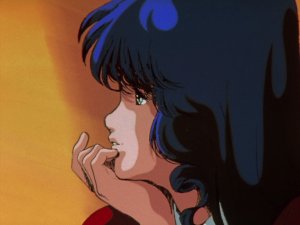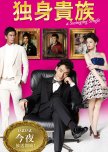They don't make 'em like this anymore.
Dokushin Kizoku hearkens back to the days when Hollywood produced sparkling romances, and immortal beauties such as Audrey Hepburn led us through them. Though it might not evolve into a classic in its own right, this is a drama which channels cinema's golden era with gusto. Western viewers, as well as those who exalt in old films, will enjoy and understand its purpose best. But doubtlessly, those "old souls," among us will find something to love as well.
"Familiar" describes Dokushin Kizoku wonderfully, though without the negative connotations that word sometimes bears. So frequently one hears the hardened drama veteran lamenting a fine watch stooping to the "same-old, same-old." However, the devices used in the plot here are not cliches often seen in Asian film and dramas; they are rather western conventions, so far fallen out of use as to be refreshing. What results is a delightfully nostalgic romantic comedy with the flavors of East and West delightfully blended. And if you've heard this feels somewhat like King of Dramas, that would be true enough; just don't expect a remake or more than superficial similarities.
My most serious issue is that the romantic conflict became a pain around the ninth episode. Much as I loved the ultimate pairing, it eventually felt set in stone so the continual flutter around the subject was frustrating.
Another point of interest will be the awesome use of romance/marriage quotes used to preface each episode.
Kusanagi Tsuyoshi always struck me as one of the better actors to come out of SMAP; my observation stands. As the commitment-phobic director Hoshino Mamoru, he rises above the realms of two-dimensionality. By the end of the series, we have a clear portrait of a man with unique interests and solitary pleasures, a person who believes he's happy alone but doesn't realize he just hasn't met the right person yet. Ito Hideaki plays second lead and brother to Kusanagi-san, as Susumu. This character was well-realized too and felt like a real person, despite his over-the-top playboy reputation. Wrapping up the leads, we had the lovely Kitagawa Keiko; her Haruno Yuki might be one of my favorite leads from a romantic comedy in ages. She felt strong despite her romantic confusions. Her unique adoration of film and the script writing process really bolstered her likability.
The supporting cast was somewhat forgettable, though one or two portrayals were poor. This includes the awful Hoshino aunt, whose lines felt as though they were being delivered from a cue card. Sasai Eisuke, however, has a hilarious though brief turn as Susumu's divorce lawyer. Did I laugh out loud any time he appeared? You bet.
Much of what helps boost a film into iconic status is its soundtrack. Dokushin Kizoku adopts various themes from famous romance films, mostly shirking original tracks of its own. This added to the classic, beautifully dated atmosphere the drama exuded throughout its pace. Vocals from Breakfast at Tiffany's (Moon River) and Sleepless in Seattle (If I Fall In Love) are most memorable among these. Some viewers may not enjoy this, however; while following the drama, I did notice people expressing displeasure at the inclusions. And for SMAP fans, yes: they provided the theme song as always (Shareotsu).
Questa recensione ti è stata utile?























